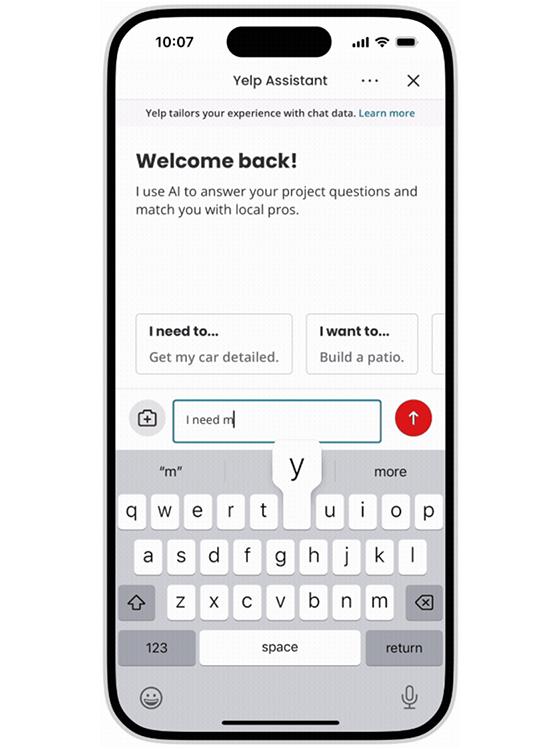
Yelp has unveiled its fall product release ranging from
AI-powered call and answer services to scheduling, but the most advanced feature is “Yelp Assistant,” the company’s chatbot that now has a memory.
The assistant launched
earlier this year, but the updated version can remember facts and preferences. It allows the app's AI chatbot to store and reference past chat data, so it can provide a more personalized and
streamlined user experience in the future.
This information is referred to as "memories" and is used to offer more relevant suggestions when someone uses the assistant to find services and
information.
When someone interacts with the Yelp Assistant, it collects and retains the chat data. For example, if you mention needing a specific car repair, it can remember the make and
model of your vehicle.
advertisement
advertisement
This memory feature will become a benefit to advertisers looking to target consumers in the market for a specific product because the stored information referred
to as “memories” is used to automatically populate details for future project requests.
For example, if the assistant knows a consumer prefers a specific type of cleaning product
or has a specific type of dog, it can use this information to filter service professionals to become more precise with the information it returns or suggests.
When OpenAI announced its browser
Atlas on Tuesday, Altman also referenced that the platform has a memory. Robert Kurtz, strategic business outcomes partner at Basis Technologies, mentioned to MediaPost in an email that
"memory" will become the ad-targeting mechanism to replace cookies.
It's not clear how long Yelp will retain data, but there is a way to delete it. Users can view or remove
memories in the app's settings. Removing a memory will prevent Yelp from using it to personalize the user’s experience, but the Yelp Support Center notes that it may take up to 72 hours for
changes.
The assistant also provides information about restaurants, bars, local attractions, and retailers listed in its directory to answer questions about topics such as vegetarian options,
where to park, or what others like about popular attractions.
Powered by large language models (LLMs), this next evolution uses details from community-generated content such as reviews,
photos, and information on business pages and websites.
Yelp Chief Product Officer Craig Saldanha in a
video described the updates and said the company is rolling out more than 30 changes. The search experience uses natural language, with the ability to transcribe and share results.
Saldanha also described “Menu Vision,” a new AI-powered feature that surfaces dish photos in real time when the consumer points the phone’s camera at a menu. Natural language and
voice allow the user to search for information and see richer insights about local businesses across platforms like “Popular Offerings” and AI-stitched videos to easily connect with and
hire service professionals.
“Yelp Host” and “Yelp Receptionist” are part of a broader push to streamline customer management.
The host feature can answer calls
from guests and manage tables, using AI to make reservations via phone, modify or cancel bookings, provide up-to-date waiting times, and make special requests. Yelp previewed the tool in April.
The receptionist feature will only become available for eligible businesses at first, but a company executive said it will become widely available for local businesses across categories in the
coming months.